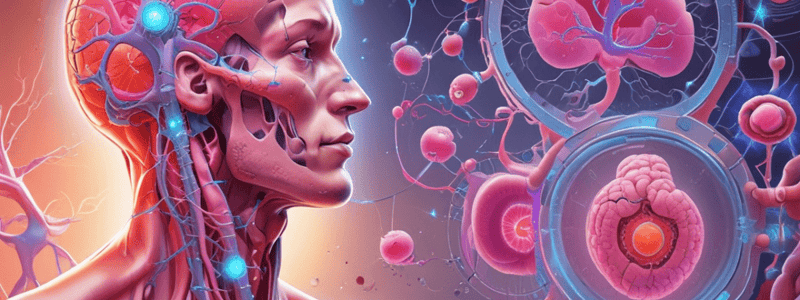Podcast
Questions and Answers
Which of the following statements accurately describes homeostasis?
Which of the following statements accurately describes homeostasis?
- Homeostasis is the ability of the body to maintain a relatively stable external environment within physiological limits.
- Homeostasis is the process by which the body maintains a constantly changing internal environment.
- Homeostasis is the body's ability to maintain a relatively stable internal environment within physiological limits. (correct)
- Homeostasis is the ability of the body to maintain a constant internal environment, regardless of physiological limits.
Which of the following statements accurately describes the internal environment?
Which of the following statements accurately describes the internal environment?
- The internal environment refers to the composition and characteristics of the body's external surroundings.
- The internal environment refers to the composition and characteristics of all fluids in the body, including intracellular and extracellular fluids. (correct)
- The internal environment refers only to the composition of extracellular fluid.
- The internal environment refers only to the composition of intracellular fluid.
What is the primary difference between the nervous system and the endocrine system in terms of their responses?
What is the primary difference between the nervous system and the endocrine system in terms of their responses?
- The nervous system targets receptors, while the endocrine system does not.
- The nervous system initiates cellular responses, while the endocrine system does not.
- The nervous system responses are fast-acting and short-term, while endocrine system responses are slow-acting but long-term. (correct)
- The nervous system uses neurotransmitters, while the endocrine system uses hormones.
Which of the following processes is NOT influenced by hormonal actions?
Which of the following processes is NOT influenced by hormonal actions?
Which of the following statements accurately describes the role of hormones in metabolism?
Which of the following statements accurately describes the role of hormones in metabolism?
Which of the following statements accurately describes the concentration of potassium and sodium in intracellular and extracellular fluids?
Which of the following statements accurately describes the concentration of potassium and sodium in intracellular and extracellular fluids?
Which of the following physiological processes is NOT regulated by hormones?
Which of the following physiological processes is NOT regulated by hormones?
Which of the following is NOT an endocrine gland?
Which of the following is NOT an endocrine gland?
What is the primary function of the pancreas?
What is the primary function of the pancreas?
Which of the following statements about endocrine glands and tissues is TRUE?
Which of the following statements about endocrine glands and tissues is TRUE?
Which of the following is an example of an organ with endocrine tissue?
Which of the following is an example of an organ with endocrine tissue?
Which of the following hormones are involved in immune system development and responses to infections?
Which of the following hormones are involved in immune system development and responses to infections?
Which of the following statements about the reproductive organs is TRUE?
Which of the following statements about the reproductive organs is TRUE?
Which of the following hormones are involved in regulating growth and development from embryo to adulthood?
Which of the following hormones are involved in regulating growth and development from embryo to adulthood?
Flashcards are hidden until you start studying
Study Notes
Homeostasis
- Maintaining a stable internal environment despite external changes.
- Essential for proper cell function and overall health.
Internal Environment
- Consists of the fluid surrounding body cells (extracellular fluid).
- Includes interstitial fluid and blood plasma.
- Maintains optimal conditions for cellular processes.
Nervous vs. Endocrine Systems
- Nervous system: Rapid, short-term responses via nerve impulses.
- Endocrine system: Slower, long-term responses via hormones.
Hormonal Influences
- Not influenced by hormones: Some processes like simple diffusion or passive transport.
Hormones and Metabolism
- Regulate metabolic pathways, influencing energy production, nutrient utilization, and waste disposal.
Ion Concentrations
- Intracellular fluid: High potassium (K+), low sodium (Na+)
- Extracellular fluid: High sodium (Na+), low potassium (K+)
Non-Hormonal Regulations
- Some physiological processes like reflexes are not directly regulated by hormones.
Endocrine vs. Exocrine Glands
- Exocrine glands: Release secretions into ducts, like sweat glands.
- Endocrine glands: Release hormones directly into the bloodstream.
Pancreas Function
- Produces digestive enzymes and hormones like insulin and glucagon.
Endocrine Glands and Tissues
- Some organs contain scattered endocrine cells that secrete hormones.
Organs with Endocrine Tissue
- The heart contains endocrine cells that secrete atrial natriuretic peptide (ANP).
Hormones in Immunity
- Thymosin from the thymus gland.
- Cytokines from various immune cells.
Reproductive Organs
- Both male and female reproductive organs have endocrine functions.
Growth and Development Hormones
- Growth hormone (GH) from the pituitary gland.
- Thyroid hormones (T3, T4) from the thyroid gland.
- Sex hormones (estrogen, progesterone, testosterone) from gonads.
Studying That Suits You
Use AI to generate personalized quizzes and flashcards to suit your learning preferences.




